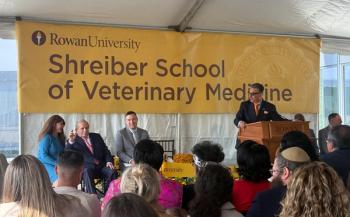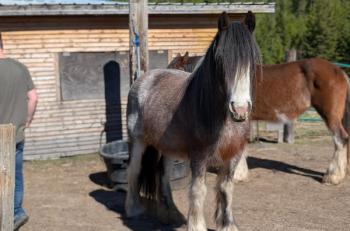
Toxin suspected in deaths of 21 polo horses
Was it an ingested toxin that caused the deaths of 21 polo horses at the 105th U.S. Open polo tournament Sunday?
Wellington, Fla.
-- Was it an ingested toxin that caused the deaths of 21 polo horses Sunday at the 105th U.S. Open polo tournament? At least one veterinarian thinks so, with toxicology tests still pending.
The horses, worth up to $2 million, belonged to a 60-horse Venezuelan team, Lechuza Caracas. The animals reportedly appeared dizzy and disoriented while being unloaded from their trailers Sunday afternoon just prior to a 3 p.m. match. Seven died at the scene, and the others during treatment elsewhere or while being moved to a medical facility.
"Some died right away. Others lasted about 45 minutes," said Dr. Scott Swerdin, of the Palm Beach Equine Clinic, International Polo's consulting veterinarian group, who treated at least one of the horses. It appeared they died of heart failure caused by a toxin that could have tainted their food, vitamins, supplements or all three, Swerdin said.
Any kind of airborne infection was ruled out, officials said.
Eyewitnesses said several veterinarians from Wellington, a wealthy equestrian and golfing community in central Palm Beach County that hosts the event every year, rushed to the grounds to help try to revive and save some of the horses by running cold water on them and using fans that shoot a fine water mist to try to get their body temperatures down. Intravenous tubes were inserted to help them breathe.
Large blue tarp screens were put around the horses to shield them from direct view of the audience.
Another veterinarian at the scene, Dr. James Belden, told NBC's "Today" show Monday morning it appeared some type of poison was to blame and could have led to what he believes was heart failure among the horses. "Well, clearly it's an intoxication, clearly there's some sort of poison," he said during the telecast, adding that it remains to be seen "whether it's something in the environment or something that the horses were exposed to." He said the horses followed a normal routine in the stable before the match.
"It could be the water, hay, bedding. We just don't know. When we find out what it is, we will take all the necessary actions," said John A. Wash, president of polo club operations. "It was heartbreaking, to see that many horses get sick all at once."
Necropsies were being conducted by State Veterinarian Dr. Mike Scott at the state-run Kissimmee Diagnostic facility. A preliminary report was expected late Monday or sometime Tuesday.
After the incident, an exhibition match replaced the match in which the fallen horses were to have participated. Each 10 or 11 years old, the horses were said to be worth about $100,000 each. The Lechuza team was considered among the best of the eight teams entered. It could take 10 years to rebuild the team to the same level, some polo experts said.
The U.S. Polo Association, the sport's governing body, said it also plans a full-scale investigation.
Newsletter
From exam room tips to practice management insights, get trusted veterinary news delivered straight to your inbox—subscribe to dvm360.






